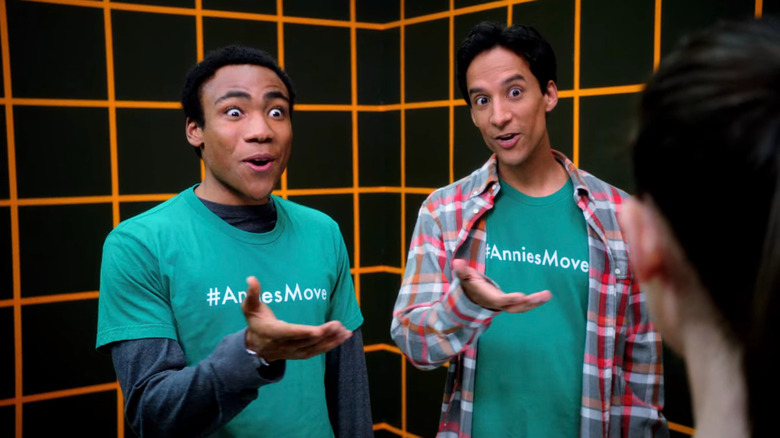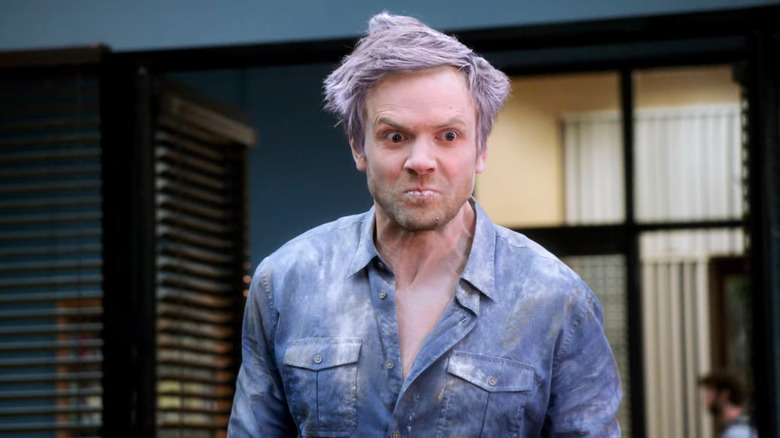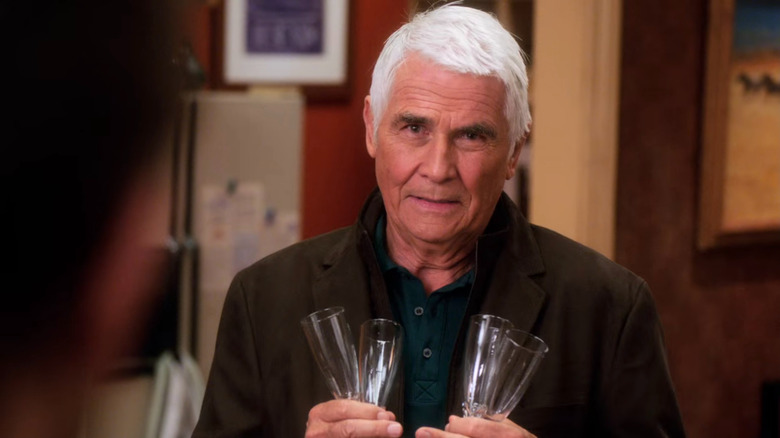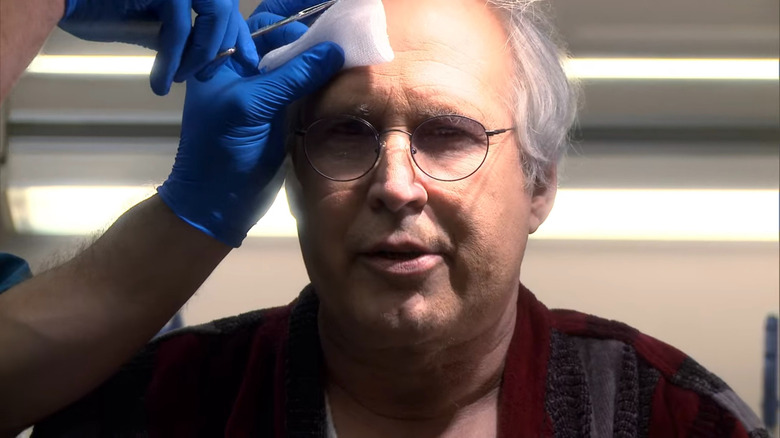The Conversation That Got Dan Harmon Kicked Off Of Community
Making any television show is incredibly difficult. No show proves that more than the beloved sitcom "Community," which went through so much tumult over the course of its six seasons. Punishingly long hours, an erratic creator and showrunner who was fired and then rehired, loss of core cast members, getting canceled at NBC, finding a new home and subsequently tanking an entire streaming service. We like to think that making comedy is easy and fun, but it can be a lot to handle. Kudos to the folks on "Community" who came out of it on the other side without losing their minds.
Obviously, the strangest element among all of the production woes on "Community" was the firing of Dan Harmon. Rarely do showrunners reach the level of celebrity that Harmon did, and when they do, it's even rarer to see them booted off the show they created. He may have been a fount for expertly crafted jokes, inventive commentary on the sitcom form, and characters with endless depth, but his working behavior was ... not great, Bob. Shooting hours would extend because he would be writing last minute pages sent directly to set to be shot. He was also an admitted heavy drinker, which probably didn't make him the most fun to be around. There was also the contentious relationship he had with star Chevy Chase. After the show wrapped, we learned about him sexually harassing one of his writers, which he fully copped to.
It made sense why NBC felt the need to fire Dan Harmon, even though most everyone involved in the show knew it would hurt the quality. The network put up with him for three seasons, but Harmon believes one specific conversation broke the camel's back that allowed for him to finally get sacked. And it might surprise you.
Daddy issues
Though "Community" is an ensemble comedy, the true principal character of the show is the disbarred lawyer Jeff Winger, played by Joel McHale. Over the first three seasons, we spend a lot of time digging into Jeff's insecurities about aging, vanity, power, sex, and loneliness. A major key to all of this was a checked out father in his life. As they were developing season 3, a plot line about bringing Jeff's father into the fold was being floated around, but there was a disagreement between Harmon and the network on how to go about it. Speaking with The Independent, Harmon believes this butting of heads led to him getting fired:
"During season three we started breaking a story about bringing Jeff Winger's dad into the mix and I remember getting a phone call warning me not to make it too dark. I said, 'Well, I just won't do it and if you guys ever decide to fire me, you can do the version of a father story without me.' I'm not going to break a story about Jeff Winger meeting his estranged, possibly alcoholic, con artist father with the mandate that it puts a pep in your step for people who don't watch the show. I think more than anything, that's the conversation that got me fired."
Of course, this disagreement wasn't the sole reason he was fired, and Harmon knows that. He continues:
"[B]ut it was just the straw that broke the back. I'd got into the habit of saying 'fire me then' to what I perceived as unresolvable conversations. It wasn't to be difficult or like I didn't believe they'd fire me – it was truly me just trying to resolve conflict."
They called his bluff. He was fired, but the dad story wasn't kaput.
They brought in the dad anyway
For season 4 of "Community," Dan Harmon was replaced by Moses Port and David Guarascio, who had created the show "Aliens in America" a few years earlier. They tried desperately to recapture the meta, pop culture infused spirit of "Community," but the season, referred to now as the "gas leak year," felt completely off. "Community" may have broken out because of its penchant for genre parodies and sitcom deconstructions, but its enduring success with its devoted fans was all because of the characters. No one understood these people better than Dan Harmon, and Port and Guarascio could not have whiffed harder in that realm.
Case in point: they decided to do an episode featuring Jeff Winger's father, casting James Brolin in the role. Firstly, the casting does not make much sense. James Brolin has no history of playing emotionally detached people who use abrasive humor to distance others. If Harmon had his pick, it would have been Bill Murray, who served as one of the inspirations for Jeff Winger (particularly John Winger in "Stripes"). As he crassly put it on his Harmontown podcast:
"I just always thought Jeff Winger's dad would be Bill Murray. But there's something awesome about having all of those preconceived notions ripped away from you. It's exciting. There's something exciting about being held down and watching your family get raped on a beach. It's liberating. It makes you focus on what's important."
Secondly, the episode rings completely false, particularly because of the inclusion of a half-brother for Jeff (Adam DeVine). The emotions are forced, the comedy doesn't work, and the whole affair feels like an idea they thought they should do rather than figuring out if they could. Nothing could have been less satisfying that this meeting.
The father figure was there the whole time
Even if Dan Harmon had gone ahead with his own version of the Jeff Winger dad storyline, there's a chance it was never going to be a particularly rewarding experience. "Community" already had a father figure counterpart for Jeff that he could both argue with vehemently and find strange kinship with. That was Chevy Chase's Pierce Hawthorne. He was the arrogant, narcissistic ass Jeff confronted on a week-to-week basis who shared many of the same qualities as Jeff.
Most explicitly, Harmon address this connection in the season 2 episode "Intermediate Documentary Filmmaking." In the episode, Pierce is faking that he is dying in a hospital and concocts schemes for each person in the study group to mess with their heads. For Jeff, he claims he found Jeff's absentee father and is coming to meet him, sending Jeff into a total spiral of rage and anxiety. When Jeff eventually accepts the notion about meeting his dad, Pierce scrambles to pretend to be his dad, which causes Jeff to go into a fit of fury where he lays out everything he has always resented about his dad and Pierce. Yes, this is all done for comedy, but it could not ring more emotionally true for the characters than it does. Even meeting his own dad for real doesn't do that.
Would it have made sense to have Bill Murray as the counterpoint to Chevy Chase? Absolutely, especially considering their history. But in reality, all you really needed was what you already had in Chevy Chase. Of course, Chase isn't the best collaborator, and when Harmon came back, Chase had left the show, eliminating the chance to explore them post-dad meeting. Maybe it's best Harmon could basically ignore the James Brolin of it all, though.



